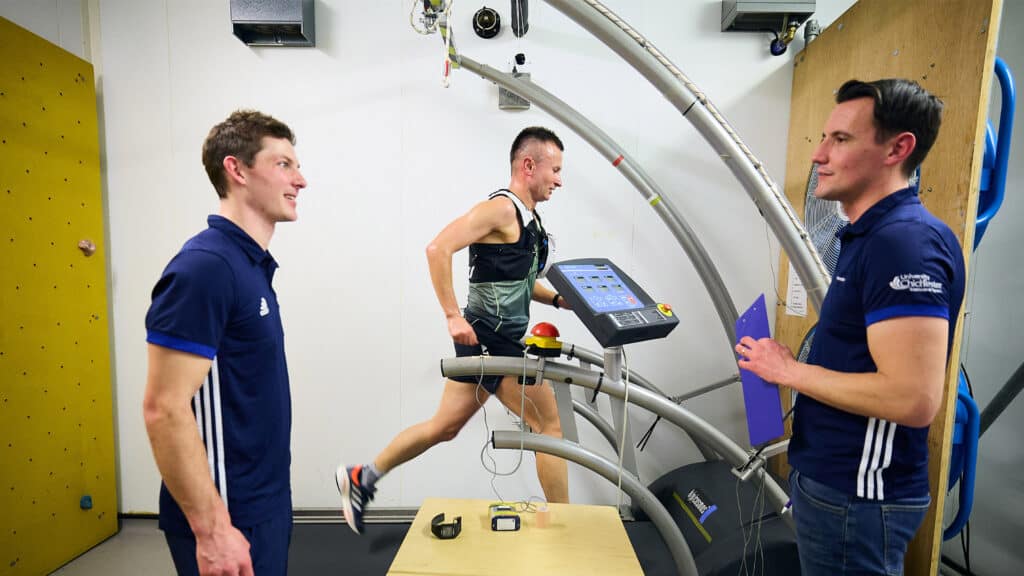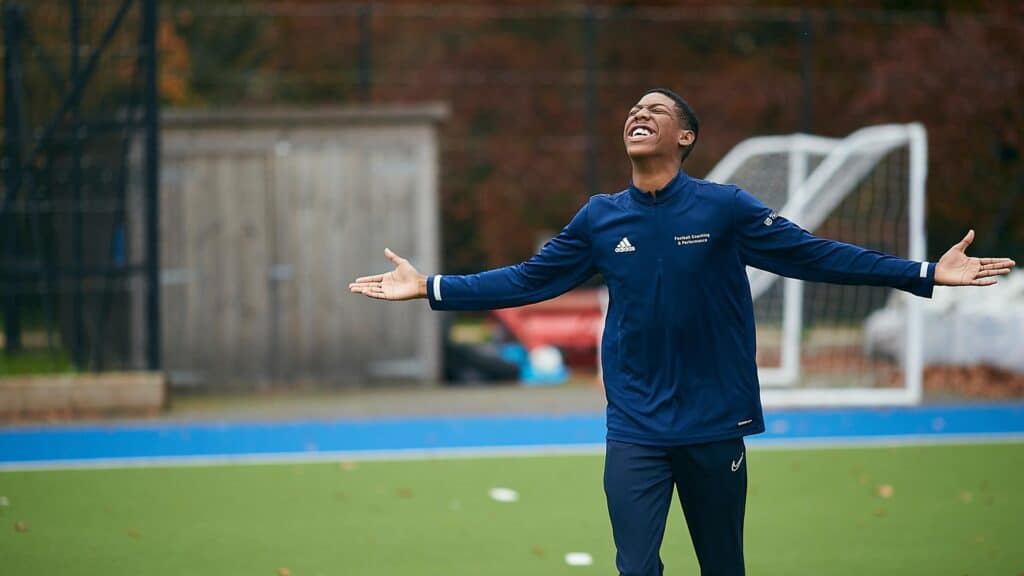Top 30
UK university out of 123 institutions
Guardian University Guide 2026
3rd
in the UK for graduate prospects in Sports Science
Complete University Guide 2026
15th
in the UK for Sport Science
The Times and Sunday Times Good University Guide 2025
Overview
Study a highly practical degree with dedicated pathways that fit your interests
If you love the science of the human body and want a highly practical degree in sport and exercise science, then we have the course for you.
Gain the knowledge and skills needed for your career
This course provides you with the scientific theory and practical skills required to support individuals and teams towards achieving their optimal performance whether that is in a sport, occupational or health setting.
Explore fundamental sport and exercise topics that include:
- Biomechanics
- Nutrition
- Physiology
- Psychology
- Strength and conditioning.
CASES-endorsed course
Endorsed by The Chartered Association of Sport and Exercise Sciences (CASES), you can be sure that this course covers the necessary foundation of sport and exercise science knowledge, technical skills and professional development competencies required to succeed in the profession.
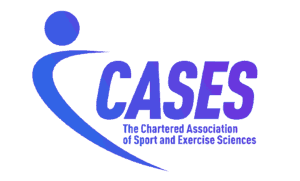
CIMPSA-endorsed course
This course is endorsed by the Chartered Institute for the Management of Sport and Physical Activity (CIMSPA), which shows that it provides the scientific theory and practical skills required to work as a sport and exercise scientist or health and exercise practitioner.

Chartered Institute for the Management of Sport and Physical Activity (CIMSPA) education partner

Qualification Approved Centre for Level 4 Award in Nutrition
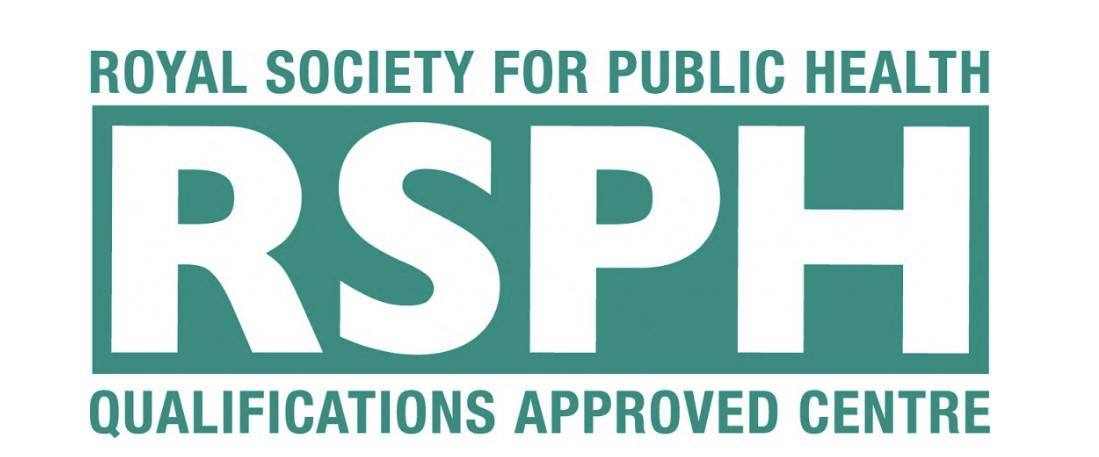
Specialise your learning around your interests
Our course structure means that you will explore the fundamental of sport and exercise science before tailoring and personalising your degree to fit your interests and career aspirations through either our Sport Performance (SP) or Physical Activity for Health (PAH) routes.
Sport Performance pathway
Our CASES-endorsed Sport Performance pathway explores how to apply sport and exercise practice to performance enhancement.
Physical Activity for Health pathway
This CASES-endorsed option focuses on the application of sport and exercise science practice to health, exercise and wellbeing contexts.
Discover our specialist facilities and laboratories
Our range of dedicated sport and exercise science facilities support you to apply theory to practice and provide you with everything you need to succeed.
Specialist facilities include:
- Biomechanics labs
- Physiology labs
- Psychology labs
- Physiotherapy and Sports Injury Clinic
- Sports Performance and Rehabilitation Unit (SPRU)
- Environmental climate chamber.
Gain real-world, hands-on experience with placement options
In the final year, there is the option to complete a placement which will allow you to apply theory and knowledge in a sport, exercise or health setting of your choice.
Previous students have worked with organisations including:
- British Sailing Team
- Premier League football clubs
- Premiership rugby clubs
- Team GB basketball
- Portsmouth FC Ladies.
Learn from active sport and exercise science practitioners
You will learn from our team of experienced, applied practitioners who are active within their fields, meaning they bring their breadth of knowledge from the wider industry into the classroom.
Smaller class sizes for better learning
Our commitment to smaller class sizes means that you won’t get lost in the crowd and that our teaching staff can provide more individualised support that fits you and your ambitions.
On this course you will:
- Study the key aspects of sport and exercise that prepare you for a successful future career.
- Choose your specialist pathway that fits in with your interests and aspirations.
- Learn from experienced and industry-active sport and exercise science practitioners.
- Feel more support from our teaching staff as they get to know you and your needs.
- Gain vital professional experience with work placement opportunities.
The Course
Learn the scientific theory and practical skills required to work as a sport scientist
Year One
In your first year, you will experience a breadth of disciplines underpinning sport and exercise science that introduce you to the fundamental areas of biomechanics, physiology and psychology.
Choose your pathway
You can tailor your course to your interests with our choice of modules and pathways, meaning that you will graduate with an individual experience – no two graduates will have the same profile – which is essential to helping you stand out in the job market.
Whichever pathway you choose, you will complete a highly practical degree where you can get hands-on experience with industry-standard equipment in state-of-the-art facilities.
Sport Performance
This pathway focuses on how sport and exercise science principles and practices can enhance the performance of both individuals and teams, as you study areas including:
- Nutrition
- Extreme environments
- Advanced biomechanics
- Sports injury and prevention
- Performance analysis
- Occupational health
- Physical performance
- Cognitive and performance psychology.
Physical Activity for Health
This pathway is for you if you want to help make people healthier through lifestyle change and the application of sport and exercise science principles and practices, as you study topics that include:
- Health and wellbeing
- Nutritional strategies
- Sports injury and prevention
- Clinical biomechanics
- Advanced research practice
- Cardiovascular rehabilitation
- Physical performance
- Psychology of physical activity and health.
CIMSPA professional competencies
In addition, you will gain CIMSPA professional competencies in Gym-Instruction, Personal Training, Health Navigator and Long-Term Conditions.
Indicative modules
You will study a selection of core and optional modules during your degree. Each module is worth a particular number of credits and is delivered differently depending on the needs of the module.
Mark
Modules
Select a year
Investigating Sport, Exercise and Coaching
This module will provide you with the research skills necessary to support your learning within sport and exercise. It will introduce you to the philosophies that underpin different types of research, and you will learn basic techniques of qualitative and quantitative data collection and analysis.
Anatomy and Physiology
This module introduces you to the fundamental concepts of anatomy and human physiology, focusing on their application to human movement and performance in sport and physical activity.
You will explore the structure and function of key body systems, including the musculoskeletal, neurological, cardiovascular, and respiratory systems, and understand how they influence physical performance.
Specific attention is given to energy metabolism, examining how the body utilises energy during exercise across different intensities. This module also covers qualitative movement analysis and data collection for evaluating performance.
Practical sessions will allow you to apply anatomical and physiological concepts in real-world contexts, enhancing your understanding of how these systems interact during physical activity.
Sport and Exercise Psychology in Action
This module will help you understand how psychological principles can improve physical activity participation, well-being, and performance. You will study a range of cognitive and behavioural psychological factors in the context of sport and exercise.
You will also investigate a range of key issues related to physical activity, exercise, sport performance, and well-being and learn strategies to build psychological attributes and improve performance in sport and exercise.
Developing Physical Fitness
In this module, you will develop skills in health screening, needs analysis, and goal setting for diverse clients and athletes by integrating principles from gym instruction, personal training, and sports performance coaching.
Key topics include anatomy, physiology, biomechanics, and nutrition, alongside behaviour change techniques, injury prevention, and professional ethics. Additionally, the module explores business and marketing strategies for personal trainers.
You will gain practical experience in conducting health and fitness assessments, interpreting data to refine training programmes, and have the opportunity to obtain Chartered Institute for the Management of Sport and Physical Activity (CIMSPA) qualifications, meeting professional standards for gym instructor and personal trainer roles.
Professional Skills
The Professional Skills module is designed to support your transition to university study and help you develop key academic, personal and professional skills in your area of study.
Throughout the module, you will enhance your communication skills, digital literacy and academic skills to ensure you have the tools to succeed at university and beyond. Emphasis will be placed on developing skills relevant to your future career, including interpersonal skills, problem-solving and self-reflection.
The module includes the creation of a portfolio to track your progress, demonstrating how you’ve developed skills that are transferrable to your graduate career.
Introduction to Sport Biomechanics
This module introduces you to the basic concepts of biomechanics as they relate to human movement and performance in sport and exercise. You will be shown how to examine human movement and sporting technique, as well as the forces involved in creating such motion or causing injury.
Whilst linking to functional anatomy, concepts such as Newton’s laws of motion, ground reaction forces, momentum, energy, projectile motion, friction and fluid dynamics will be explored.
Practical work considers the general principles of biomechanics and relates them to experimental methodology, data analysis and statistical analysis for practical investigations with athletes.
Researching Sport, Exercise & Health
You will further develop your skills in research methods and data analysis, with a broad focus on analysis procedures including the qualitative method of interviewing and quantitative methods of analysis of variance, correlation and linear regression. These methods are commonly used procedures in the sport, exercise and health sciences, and understanding of these will also provide a solid foundation for understanding more advanced research methods that you may learn in your future work including research projects or postgraduate study.
Developing and Monitoring Physical Performance
This module aims to provide you with the skills and knowledge to design interventions for improving both health and skills-related physical fitness. You will develop the ability to complete a health screening and needs analysis on clients and athletes, establish goals, select appropriate methods of individual physical performance assessments and design interventions to improve physical performance.
Psychology of Physical Activity and Health
The course will examine contemporary theories relating to the adoption and maintenance of a healthy lifestyle. It will also examine the relationship between activity involvement and individual affective responses, cognitions of self and health-related behaviour. Specifically, theories of behaviour change and self-concept will be explored alongside an emphasis on the positive and negative consequences of exercise involvement.
Clinical Biomechanics
This module aims to build upon the core biomechanical principles underpinning the practical analysis of human movement. It will also consider the role of biomechanical analysis in sports therapy and the assessment of patients. It will serve to widen your knowledge base and show the integrative nature of the separate disciplines of therapy and biomechanics.
Nutrition for the Prevention and Treatment of Illness and Disease
This module will examine the combined effects of nutrition and physical activity on health, with particular focus on prevalent diseases associated with these factors.
Topics covered will include:
- dietary guidelines and analysis
- measurement of energy
- macro- and micro-nutrient intake
- digestion, absorption and metabolism
- the role of micro-nutrients
- nutrition, prevalent diseases and special populations e.g. diabetics.
- obesity, eating disorders and food allergies.
Accreditation
The Royal Society for Public Health accredits this module, so you know the content of it is relevant and up to date.

Project Management
This module aims to equip you with the tools and skills necessary to manage sports projects effectively and to demonstrate the importance of following a prescribed project management methodology. You will explore the concepts of project management in a practical way including effective scoping, planning, resource allocation, risk and issue management, project monitoring, reporting and review.
Clinical Exercise Physiology
This module explores the relationship of physical activity and sedentary behaviour with both the development and control of non-communicable diseases (NCD).
You will examine the physiological responses to physical activity, and methods to assess health and fitness for those individuals suffering from such disease states.
You will explore the application and appraisal of exercise prescription guidelines for NCDs, with consideration of those that are serviced by exercise/GP referral schemes.
This module is aligned to the CIMSPA professional standards Health Navigator and Long-Term Conditions.
Stress, Coping and Emotions
This module aims to examine the demands (i.e. stressors) of sport and how these are experienced by athletes, the appraisals and coping strategies employed by athletes when experiencing these stressors, and the subsequent emotional responses.
The Outdoor Experience: Emotions and Wellbeing
The aim of the module is for you to explore the experience of being in the outdoors from an emotional and wellbeing perspective.
The restorative and therapeutic benefits of immersive experience will be examined and these will include creative activities, understanding of place and connectedness to the environment and others.
Critical Issues in Health Promotion, Lifestyle and Exercise
The module aims to provide you with a critical appreciation of the principles, theory and practice of health promotion in the UK. This will involve the application of the knowledge of sport, health and physical activity in the context of the wider social, cultural and environmental issues facing agents of health promotion.
Reflection: Developing Your Teaching and Coaching
This module aims to provide an opportunity to select and develop specialist areas of interest.
You will be required to develop skills in introspection, reflection and reflective practice, drawing upon theoretical concepts relating to pedagogy of sport and education.
You will agree a suitable programme of work within a professional context of your choice, which will involve you immersing yourselves in the culture and practices of this working environment.
Sports Injury and Prevention
In this module, you will study basic musculo-skeletal anatomy, including features particularly prone to injury in sport e.g. ligaments; incidence of sport injury. You will explore common injuries to the body and their methods of occurrence, as well as first aid procedures and injury assessment. You will also study the role of biomechanics in predisposing factors, psychology and prevention of injury, as you consider treatment methods, rehabilitation and real-world case studies.
Sport and Exercise in Extreme Environments
This module aims to examine the physiological challenge of performing in extreme and hostile environments and to examine how the human can exercise, maintain homeostasis and survive.
It will explore the theoretical limits of human performance, looking to identify mechanisms of physiological acclimatisation and adaptation.
You will consider how this may be used to increase sporting performance and maximise safety e.g. competitions such as the Everest Marathon and Marathon Des Sables.
Physiological Limitations to Performance
This module examines the metabolic, neuromuscular, neuroendocrine and cardiovascular systems of the human body to develop knowledge on the nature of limitations to performance across this intensity spectrum.
Cognitive Psychology for Sports Performance
Within the sporting domain, knowledge of cognitive psychology can promote efficient acquisition and effective performance of skill among athletes at all stages of skill development. This module critically examines the strengths and weaknesses of theory and research concerning the cognitive processes that underpin the acquisition and performance of skill.
Performance Psychology
This module will introduce you to the key theories and concepts in performance psychology, examining theory and research into a range of factors (e.g., confidence, motivation, emotional regulation) that have been proposed to contribute to performance in sport and other achievement domains.
The module content will seek to develop understanding of the importance of these concepts for performance, their determinants and how to change them.
Sports Injury and Prevention
In this module, you will study basic musculo-skeletal anatomy, including features particularly prone to injury in sport e.g. ligaments; incidence of sport injury. You will explore common injuries to the body and their methods of occurrence, as well as first aid procedures and injury assessment. You will also study the role of biomechanics in predisposing factors, psychology and prevention of injury, as you consider treatment methods, rehabilitation and real-world case studies.
Biomechanics in Sport and Exercise
The biomechanical principles underpinning performance in a range of sports will be considered in relation to practical performance of sport. The module content will include analysis methodologies and research, which has enhanced biomechanics knowledge of sports performance.
The biomechanics analysis and evaluation of selected sport and exercise activities will be considered e.g. golf, football, tennis, high jump, long jump, javelin, discus, gymnastics, cycling, swimming.
Researching Sport, Exercise & Health
You will further develop your skills in research methods and data analysis, with a broad focus on analysis procedures including the qualitative method of interviewing and quantitative methods of analysis of variance, correlation and linear regression. These methods are commonly used procedures in the sport, exercise and health sciences, and understanding of these will also provide a solid foundation for understanding more advanced research methods that you may learn in your future work including research projects or postgraduate study.
Stress, Coping and Emotions
This module aims to examine the demands (i.e. stressors) of sport and how these are experienced by athletes, the appraisals and coping strategies employed by athletes when experiencing these stressors, and the subsequent emotional responses.
Performance Analysis in Sport
The analysis undertaken could relate to technical, tactical and/or physical aspects of performance. The use of sports performance analysis is paramount in light of the limitations of human memory, such as the volume of event recall and subjectivity. The module aims to introduce you to the key concepts, skills and techniques associated to performance analysis, and outline its place in the scientific support of individuals and teams.
Developing and Monitoring Physical Performance
This module aims to provide you with the skills and knowledge to design interventions for improving both health and skills-related physical fitness. You will develop the ability to complete a health screening and needs analysis on clients and athletes, establish goals, select appropriate methods of individual physical performance assessments and design interventions to improve physical performance.
Nutrition for the Prevention and Treatment of Illness and Disease
This module will examine the combined effects of nutrition and physical activity on health, with particular focus on prevalent diseases associated with these factors.
Topics covered will include:
- dietary guidelines and analysis
- measurement of energy
- macro- and micro-nutrient intake
- digestion, absorption and metabolism
- the role of micro-nutrients
- nutrition, prevalent diseases and special populations e.g. diabetics.
- obesity, eating disorders and food allergies.
Accreditation
The Royal Society for Public Health accredits this module, so you know the content of it is relevant and up to date.

Dissertation
You are encouraged to identify a research question appropriate to your degree pathway that is of interest and relevance to your studies. The investigation may be based within single or multiple disciplines. An appropriate approach to addressing the question is then determined through discussion with tutors in your chosen area.
Exercise And Physical Activity Interventions
This module applies health-behaviour-change theory and research to the promotion of physical activity in specialised populations, such as those with chronic health conditions or physical disabilities. It looks at different types of interventions, such as those targeting individuals, groups and national campaigns.
Cardiovascular Rehabilitation
This module critically examines the process of rehabilitation as it pertains to cardiovascular disease. Detailed exploration of the aetiology of coronary heart disease (CHD), lifestyle management, and psychology of behaviour change in relation to lifestyle. The evidence-base for exercise and nutritional interventions will be critiqued within the framework of primary, secondary, and tertiary care alongside the skills required to compile multi-disciplinary interventions for secondary prevention.
Health And Wellbeing Clinic
This module provides you with an opportunity to complete a unit of directed study incorporating experience in a practical-based setting, relevant to working with clinical populations. You will develop new knowledge and skills whilst in a practice-based setting, in addition to applying, consolidating and reflecting on the learning gained in your prior modules. You will gain experience that enables you to develop, apply and reflect on the clinical practice of exercise within the health service.
Advanced Research In Sport And Exercise
This module accesses sections of the provision for MSc students and so begins to move you towards postgraduate level thinking. You will work alongside MSc students to access sections of work at the appropriate level. Assignments will reflect that the module is in Year Three but will take an applied approach to promote independent use and evaluation of research methods and statistics.
Work Placement In Sport & Exercise Science
An opportunity to complete a unit of directed study incorporating a work placement of 105 hours (three weeks) in a sport and exercise environment. This placement can take place in a wide range of environments including sports clubs, schools, colleges, private companies, clinical settings or within the community. The focus of the work placement should be relevant to your needs, the programme of study you are taking and career aspirations.
Nutritional Strategies For Sport Performance
Sports performance and the development of athletic ability relies on the individual being in peak health and having the correct nutrition support to fuel training adaptation and exercise performance. This module aims to examine the ways in which dietary intake influences energy metabolism, recovery of skeletal muscle after exercise, exercise performance, training adaptation, injury risk and immunity.
Psychology Of Injury And Rehabilitation
This module enables you to critically evaluate the psychological, social and cultural factors in injury risk, theories of psychological responses to injury, recovery and adherence to rehabilitation programmes. It will critically evaluate theory and research, and consider practical approaches to working with injured athletes to assist them with their response to and rehabilitation from injury experiences.
Biomechanical Techniques
The module will introduce you to the fundamental principles and techniques of biomechanics. You will learn how to apply these within a teaching context and understand how it affects the pupils you teach.
Planning and Monitoring of Training and Performance
A focus on planning and monitoring training of athletes and how a programme of physiological support can be used to enhance performance.
You will engage in current literature identifying the physiological demands of the athletes chosen sport, key measures of physical fitness and how we can enhance them.
An athlete’s ability to focus on training to gain maximal physiological adaptations, and relax in competition, can represent the difference in making the podium or winning major tournaments.
Contemporary Issues in Sport, Exercise and Health
This module will explore a selection of contemporary issues that may have ethical and moral considerations, in relation to sport, exercise and health.
Biomechanical Techniques
This module aims to enable you to develop experimental skills that may be of relevance, not only in biomechanics, but also in other scientific fields where accuracy of measurement is important.
Group Dynamics in Sport
This module aims to examine and evaluate current knowledge of sport group productivity and functioning and evaluates current practice in developing and increasing the effectiveness of group functioning. It is important to have an understanding of group dynamics due to the potential impact that groups can have on an individual’s performance, life satisfaction and psychological wellbeing.
Applied Sport Psychology: Delivering Mental Strategies
Traditionally, sport psychologists have advocated the use of numerous mental training strategies that are purported to enhance the cognitive, affective and behavioural states of the performers that they work with. This module provides you with an understanding of the efficacy of these strategies, to provide opportunities to deliver these mental strategies and to reflect on the delivery of these strategies.
Advanced Biomechanics
This module aims to allow you to develop your conceptual biomechanics knowledge, knowledge of current practice and independent practical skills. It gives the opportunity to follow interests within the field that may have been stimulated by either the third year biomechanics techniques module, or by areas you have come across in the course of your independent project work and which you would like to investigate further. It aims to develop your independence in the laboratory.
Entrepreneurial (Business Setup)
This module focuses on the environmental factors that are directly relevant to a small business context, to allow you to develop a critical understanding of the entrepreneurial process. You will concentrate upon the planning that needs to be undertaken prior to the start-up of a small business.
Applied Sport Psychology: Professional Practice
The soft skills required by a sport and exercise psychologist are imperative to effectiveness as a practitioner. The aim of the module is to examine the nature of applied sport psychology practice and discuss and critique how sport psychologists work with clients in relation to initial assessment, case formulation, intervention planning and delivery, monitoring and evaluation.
Practical Pedagogy (Placement)
An opportunity to experience a placement within a practical setting. This module aims to develop and refine pedagogical skills so that you can enhance pupil/performer progress and learning within a practical environment.
Occupational Health and Performance
The module aims to provide you with an understanding of how evidenced-based practice can be used to improve health and performance in occupational settings such as the military, emergency services and industry.
Nutrition for Sports Performance, Physical Development and Health
Sports performance and the development of athletic ability relies on the individual being in peak health and having the correct nutrition support to fuel training adaptation and exercise performance. This module aims to examine the ways in which dietary intake influences energy metabolism, recovery of skeletal muscle after exercise, exercise performance, training adaptation, injury risk and immunity.
Work Placement in Sport and Exercise
This module offers an opportunity to complete a unit of directed study incorporating a work placement of 105 hours (three weeks) in a sport and exercise environment. This placement can take place in a wide range of environments including sports clubs, schools, colleges, private companies, clinical settings or within the community. The focus of the work placement should be relevant to your needs, the programme of study you are taking and career aspirations.
Research Project
The research project provides an opportunity to apply appropriate knowledge, concepts, and techniques to an in-depth study of a particular question or problem relating to sport, exercise or healthcare.
This module aims to foster a greater understanding of the processes to undertake a small-scale research project and marks the culmination of the student’s learning experience over their undergraduate programme of study.
Teaching and Assessment
Innovative teaching methods that focus on evidence-based practice
Smaller class sizes for better learning
You will build your subject knowledge and practical experience through lectures, workshops and tutorials in small classes, which means our expert teaching staff really get to know you and the support you need.
Teaching
Our team of Lecturers, Senior Lecturers, Readers and Professors ensure innovation, enthusiasm and expertise combine to deliver the excellent standards that give our institution its high reputation.
When you come to Chichester, you will join a community of students and staff working in partnership to ensure that your learning experience reflects best practice and embraces the opportunities presented by new, interactive technologies.
Many sessions will require you to have completed some preparatory work and you will also be given structured follow-up work after a session to further progress your learning, often reading or an individual/group task. As you progress through your degree you will be expected to take more and more ownership over your learning and development, directing your study into areas of most interest to you.
Find supportive staff ready to help you reach your goals
Modules are assessed at every stage of the course, offering cumulative assessment of your progress, which means you can monitor your own progress throughout your degree and discuss and plan your development with your lecturers throughout the course.
Where appropriate, special arrangements can be made for students with identified needs.
Assessment
Our course includes a mix of assessments to help you develop a wide range of transferable skills.
You will be assessed through a variety of methods, including:
- Essays
- Examinations
- Portfolios
- Practical assessments
- Lab reports
- Oral presentations.
Facilities
Discover a wide range of excellent sporting facilities that support your learning
Sports laboratories
We have four specialist psychology labs including a virtual reality reader, brain imaging unit and an observation suite.
Sports injury clinic
Sports Therapy students use our specialist injury clinics for practical sessions and to run a practice.
Tudor Hale Centre for Sport
Our world-class Tudor Hale Centre for Sport acts as the focus for sports science, therapy and physiology.
Sports hall
Our specialist sports hall can be used for a wide range of indoor sports, including basketball, netball, badminton and volleyball.
Specialist outdoor sports pitches
Alongside our grass football and rugby pitches, we also have our International Hockey Federation compliant floodlit astro turf.
Fitness suite
We offer a variety of cardio, resistance and weight equipment, with a dedicated strength and conditioning room.
Sports Dome
The Sports Dome is a large indoor facility which can be used for sports such as cricket, football, hockey and many more.
Experience
Discover a close student community and a supportive environment
Close community
Our commitment to a friendly and close-knit student community contributes to a high degree of success for our graduates.
Expert staff
Learn from experienced sport and exercise science specialists here to support you throughout your degree.
Placement partners
We have developed strong connections with our partners to provide you with work placement opportunities.
Learning Resource Centre
The Learning Resource Centre (LRC) contains the library, a café, IT/teaching rooms and the Support and Information Zone (SIZ).
Library
Our campus library holds more than 200,000 books and over 500,000 eBooks.
Subject specific librarians
If you have difficulty finding material for an essay, seminar or project, subject librarians will be happy to provide assistance.
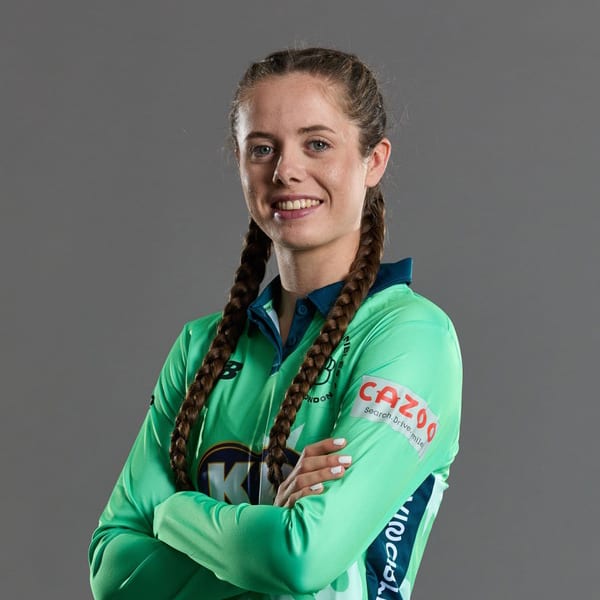
Danielle
Andy
Placement Opportunities
Utilise our extensive professional networks to support your learning
In your final year, you will have the option to complete a placement that will give you the opportunity to further develop transferable skills which will make you more employable.
There are many placement opportunities depending on your field of interest and career aspirations, and whether or not you would like to progress to a postgraduate degree, including our world-renowned research and consultancy groups.
Previous students have undertaken placements with:
- uCHAMP (in collaboration with St Richard’s Hospital) – University of Chichester Health Awareness and Maintenance Programme
- OPRG – Occupational Performance Research Group
- SPRU – Sports Performance Rehabilitation Unit
- British Sailing Team
- Premier League football clubs
- Premiership rugby clubs
- Team GB basketball
- Lewes FC
- Portsmouth FC Ladies
- Surrey Storm Netball
- Southsea Rowing Club
- Sussex Performance Centre.
Whilst on placement, students have shadowed professionals such as:
- Physiological support services to athletes
- Performance analyst
- Cardiac and Respiratory Rehabilitation Exercise Practitioner
- Applied performance scientist with British Sailing Team
- Nutritional adviser supporting the bariatric surgery team at St Richard’s Hospital
- Occupational Performance Physiologist.
Dev
Industry links
Depending on the degree pathway you choose we have links with the British Sailing Team, English Institute of Sport and the NHS pulmonary and bariatric team at St Richard’s Hospital, Chichester.
We also have links to a number of amateur and professional sports teams where our students work as performance analysts.
Dedicated placement coordinator
Our Sport courses have a dedicated placement coordinator who is available to assist students and has a network of contacts in local clubs and schools.
Our students are from all over the UK, with the majority from the South and South East of England, with a few students from overseas. Many students find work placements in their home towns, as well as local opportunities in Sussex.
You will need to ensure you have all the necessary documentation in place before you start your placement. Some courses will insist that you complete a DBS check on entry to the course and others will require you to complete a check once you have started.
Please check that you have completed all necessary documentation before commencing your placement.
Study Abroad
Explore the opportunity to study part of your course abroad
As a student at the University of Chichester, you can explore opportunities to study abroad during your studies to enrich your educational experiences.
It’s a chance to broaden your horizons, a great opportunity to meet new people, undertake further travelling and to immerse yourself within a new culture.
You will be fully supported throughout the process to help find the right destination and institution for you and your course. We can take you through everything that you will need to consider, from visas to financial support, to ensure you get the best out of your time studying abroad.
Careers
Acquire the skills and knowledge required to gain employment within the sports, exercise or health sectors
A degree in sport and exercise science offers students the chance to start their career in a sector that is going from strength to strength.
We understand the importance of ensuring that you have the knowledge, skills and experience to compete successfully in today’s challenging jobs market.
With a practical-based modular approach, you have the choice and flexibility to tailor your course to your interests, learning from internationally renowned researchers and practitioners.
We firmly believe that this approach will help you stand out in the competitive employment market, with the potential of pursuing a career with the English Institute of Sport, national governing bodies, professional clubs, the NHS, private health care sector, community practitioners or further study at master’s level or PGCE.
Typical careers include:
- Health and exercise practitioner
- Athletic trainer
- Sports psychologist
- Sports science support personnel
- Sports equipment consultant
- Health promotion
- Clinical exercise scientist
- Public health
- Exercise prescription on GP referral schemes
- Human performance scientist
Megan
Amy
Further study
We offer postgraduate research programmes (MPhil/PhD) across the field of sport disciplines.
Supervision is offered by a strong, research-active team with a range of expertise. Our research interests stem from applied experience to deliver ‘real world’ meaningful results.
University of Chichester alumni who have completed a full undergraduate degree at the University will receive a 15% discount on their postgraduate fees.
Postgraduate pathways
- MPhil/MRes/PhD Sport, Exercise and Physical Education
- MRes Sport, Exercise and Health (Named Discipline)
- MSc Dance Science
- MSc Applied Sport and Exercise Nutrition
- MSc Sport and Exercise Psychology (BPS Stage 1)
- MSc Sport and Exercise Biomechanics
- MSc Sport and Exercise Physiology
- MSc Sports Performance Analysis
- MSc Strength and Conditioning
- PGCE Secondary (Physical Education).
Gifted Athlete Support Programme
Supporting athletes with their studies and sporting ambitions
The University’s Gifted Athlete Support Programme (GASP) helps students combine academic study with sport by offering support to compete at the highest level.
Our student athletes will have access to our experts in sport coaching, exercise physiology, biomechanics, strength and conditioning, performance analysis, sport nutrition, sport psychology, sport therapy or physiotherapy and receive:
- Financial support*
- Fitness Suite access at the Tudor Hale Centre for Sport
- Administrative support from SU Sport
- GASP branded kit
*Level of financial support dependent upon level of achievement in sport.
Course Costs
Course Fees 2026/27
UK fee
International fee
EU/EEA Fee Reduction Scholarship
EU/EEA students automatically pay the equivalent of UK fees via the EU/EEA Fee Reduction Scholarship
For further details about fees, please see our Tuition Fees page.
For further details about international scholarships, please see our Scholarships page.
To find out about any additional costs on this course, please see our Additional Costs page.
Entry Requirements
UCAS
A Levels
BTEC/Cambridge Technical
GCSEs
IELTS
IB
Access to HE Diploma
Contextual offers
We believe everyone deserves an equal opportunity to pursue higher education, regardless of their background.
When we receive your application we consider your personal circumstances and the factors surrounding your achievements to see if you are eligible for a contextual offer. This is an offer with a reduced entry tariff – typically the equivalent of 16 fewer UCAS points (two A-level grades).
Applicants who are predicted to achieve two or more (A-level) grades better than the published typical offer will normally be made the typical offer, rather than a reduced offer. For example, where the predicted grades are BBB, and the published typical offer is BCC, a BCC offer would be made.
Find out more about our contextual offers.
